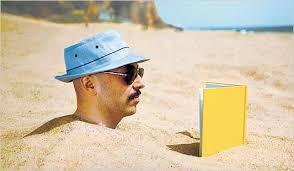Rebecca Forster's Blog, page 7
August 5, 2014
How Do You Read?
Every once in a while I get this note from a reader:
“Loved your book. Read it in a day!”
I’m elated when a reader lets me know they love one my books. Knowing they read it in one day, that’s something else again. Why, oh why, can’t I read a book in a day? The answer is, reading a book in a day isn’t my style. Reading is like eating: some of us devour our books, some pick at them, and some have a balanced book diets.
Me? I’m a Stop and Starter. How about you?
Stop and Start Reader You have a pile of open books by your bedside: fiction, non-fiction and magazines and maybe a map or two. If it’s got words on it you read it. Heck, you even count that owners manual for the TV as reading fare. You may finish a book in a week and or a year. You come back from the bookstore arms piled high or you click away on your Kindle. It doesn’t matter that you have years of reading at your finger tips because your happiest when your plate is full. You’re a different type of reader in the morning than you are at night. You like one thing on the weekend and another during the week.
The Genre Book Lover You relish every nook and cranny of your genre. Fantasy epics are like a banquet, romances are endless plates of chocolate, mysteries are exotic morsels. When you’ve found a genre you love, you stick with it no matter what anyone says. There are so many incredible authors and never enough time. The genre groupies I know are also experts in their field. How satisfying is that?
The Classic Bibliophile If it was written after the 21st century you want nothing to do with it. You’ve worked your way from the Ancient Greeks to the modernists, adore the history behind the work and nuggets of knowledge about the author. You love a challenge, you’re focused and leaving a book unfinished is not an option. You appreciate a classic in the same way you appreciate a fine wine. Good things hold up to the test of time.
The Conditional Bookworm You don’t always have a book going, but there are times that you wouldn’t be caught dead without one. Airplanes, beaches, rainy days are the conditions that leave you screaming for a book. Conditional readers don’t worry about how fashionable their choices are or how fast they read, they just need to have a book when the time is right. You’re not a series reader and Ulysses might be a bite too much but getting time to yourself to read, that’s perfect.
The Omnivore Booker You fear no book. Classics to cutting edge literature all have a place on your table. Romance, history, horror, thrillers, literature or even erotica – so long as it has two covers and pages you’ll gobble it up. Reading is the way you explore the world, it satisfies your need for variety and your desire to be challenged. You’ve never met a book you couldn’t take or didn’t love.
Next time you sit down with a book don’t give a second thought to how you read, just remember how delicious it is to read.
This article is copyright © Rebecca Forster
July 31, 2014
About the Books
“THE WITNESS SERIES IS A MUST READ FOR ANYONE WHO LOVES GOOD THRILLERS.” – AMAZON REVIEW
The Witness series is unique in the world of series. It was born with Hostile Witness, a traditional legal procedural that followed attorney Josie Bates through her defense of sixteen-year-old Hannah Sheraton for murder. Along the way, magic happened. Rebecca Forster created a fictional blended family that caught the imagination of the reading public as they connected with Forster’s unique blend of character and theme.
Each of the seven books in the series follows a super charged emotional and psychological path of the characters as they come to grips with questions of ethics, morality, self-worth, honor and trust.
Hostile Witness: Should children be tried as adults for violent crimes? How young is too young?
Silent Witness: Have fathers’ rights been abused by both the courts and women to the detriment of the children involved. How are children manipulated in divorce?
Privileged Witness: Is privilege like the race card, able to be played at a moment’s notice, stacking the social and legal deck? Is it always about money?
Expert Witness: Is the courtroom really a giant playground where the winner is the one who can throw the ball the hardest? Is destroying a reputation like murder?
Eyewitness: How civilized are we really? When an ancient code collides with modern law the question of justice isn’t as simple as it seems.
Forgotten Witness: Time marches on but in its wake it leaves memories of missteps and transgressions. If only one person suffers, does it matter that wrongs are righted?
MORE THRILLS
Rebecca Forster’s single-title novels explore the humanity of each character in the midst of life and death challenges. There are times when a single voice breaks into an author’s mind and it must be heard, the book must be written.
Before Her Eyes: The deaths of Rebecca’s father and father-in-law inspired this genre- bending exploration of this question: when faced with death does our life truly pass before our eyes?
Beyond Malice: A fourteen-year age difference between Rebecca and her sister got her wondering: is blood reason enough to put your reputation and life on the line for someone you barely know?
The Mentor: Inspired by her husband’s mentor, the first black judge appointed west of the Mississippi, Rebecca wanted to know what happens when the emotional and moral commitment of one veers off course?
Keeping Counsel: A USA Today bestseller, readers agree that Bill Hamilton is one of the most charming and chilling characters they have ever come across. Inspired by a real case, this novel explores the limits of women’s affection for one another when a dangerous man comes between them.
Character Witness: Inspired by an attorney who had, at one time, been lawyer to the stars only to be marginalized in his old age, this book is about spirit, cunning, and the dangers of counting out the fringe.
Read more...
This article is copyright © Rebecca Forster
July 10, 2014
Where I Write

 People say it’s great to work at home. Not me. I go to my local coffee shop, Coffee Cartel every morning.
People say it’s great to work at home. Not me. I go to my local coffee shop, Coffee Cartel every morning.
People think I live here! My tea is ready the minute I arrive!
My preferred table is surrounded by books!
I listen to different music with every book I write.
Read more...
This article is copyright © Rebecca Forster
July 8, 2014
Simple is Easy: Don’t Complicate Things
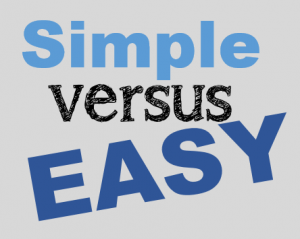 A few weeks ago, I was a keynote speaker at the Civil Judges Seminar in Los Angeles. The topic was inspiration: how to get it, what to do with it. The presentation went very well. Many judges came up to say that they truly enjoyed themselves. Then one attendee lingered and talk went from books and inspiration to my husband (also a judge on the civil bench).
A few weeks ago, I was a keynote speaker at the Civil Judges Seminar in Los Angeles. The topic was inspiration: how to get it, what to do with it. The presentation went very well. Many judges came up to say that they truly enjoyed themselves. Then one attendee lingered and talk went from books and inspiration to my husband (also a judge on the civil bench).
Hiz Honor says: “Will your husband retire soon?”
I says: We have a deal. He can stop working when I do.”
Hiz Honor says: “That’s different. All you do is sit around and make things up. That’s easy.”
I laugh (sort of).
Obviously he hadn’t been listening during my presentation. Or, maybe he had. Maybe I made it all seem so simple that he thought what I did was easy.
That exchange started me thinking about the difference between simple and easy. Weren’t those the same things? Weren’t there people for whom everything is simple? You know, those people with natural talent for whom any task was effortless?
The answer is no.
On the dais with me that day was John Kralick, author of the New York Times Bestseller, A Simple Act of Gratitude. His was a moving tale of personal desperation and a life made better by writing one thank you note a day for a year. Through this exercise, he was sure, he would find some meaning and worth to his life.
His was a simple idea but, as the book proved, it was not an easy one to accomplish. There were times when he couldn’t think of anything to be thankful for, times he couldn’t bear to look at note paper or pick up a pen. But he wrote 365 thank you notes, and in return for this simple act he received the dual gifts of clarity and focus. His was an uplifting book and a true black and white example of the difference between simple and easy.
My experience is the opposite. I have a file full of book ideas but to actually write a book means that I have to spend hours in front of the computer and many, many more hours in contemplation. I must build a believable story, sympathetic characters, choose the right words to convey drama, rearrange chapters so the pacing is right, do my best to make sure there are no typos or grammatical errors in a 100,000 word novel. I have scrapped thousands of words because they aren’t right and started from scratch. Getting the idea for a book is easy; writing it is never simple.
But it was my son who didn’t hesitate when I posed the question: Is simple the same as easy?
Of course not, he scoffed.
As a talent manager, he deals with aspiring actors who are hoping to make it to the top of a very big heap. They want to know the secret to fame and fortune is. According to my son it’s not a secret, it’s a formula.
What you want + What will you do to get it = Success.
The trick to solving this equation is that everything you do, everything you say, every situation you put yourself in, every decision you make must always be relevant to what you want. Your actions must always circle back on your intentions.
Deciding what you want is simple. It’s the completion of the equation that is not easy.
So, no matter what we set out to do – write a book, be a judge, become a famous actor, or the best parent, friend, or spouse – it all begins with knowing what we truly desire and then be willing to work every moment of every day to achieve that goal.
Funny, how much our kids know. Mine knew that the key to success is not to complicate things. That’s simple, it’s not easy to keep it simple but oh how good it is to rise to the challenge.
Read more...
This article is copyright © Rebecca Forster
FAQs ABOUT THE WITNESS SERIES
 Is Josie based on a real person?
Is Josie based on a real person?Yep. She’s a volleyball-playing judge who sat on the Los Angeles Superior Court.
How about Hannah?
Hannah is a compilation of young girls I met while volunteering in my son’s high school.
And Archer?
He’s my real life hero, my husband of 38 years. A man of few words, exceptional intelligence and supreme patience.
 Why Did You Pick Hermosa Beach as the Location?
Why Did You Pick Hermosa Beach as the Location?Josie had to live in Hermosa because it is a beach volleyball haven. This is where I would live if I could. Beautiful beach, fun restaurants, very laid back.
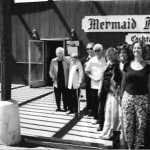 Is the Mermaid a Real Place?
Is the Mermaid a Real Place?You bet. One of the first books groups I spoke to about Hostile Witness held their meeting there. We had a ball! The Witness Series was born in Hermosa Beach – a beautiful community about five miles from my home. I often walk there, watch the volleyball players and sometimes stop for a burger or a beer at the iconic Mermaid Restaurant. What a great place for a book club meeting. You could almost swear Josie and Linda were still there sitting in a booth!
Read more...
This article is copyright © Rebecca Forster
June 18, 2014
Simple is Easy: Don't Complicate Things
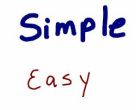 A few weeks ago, I was a keynote speaker at the Civil Judges Seminar in Los Angeles. The topic was inspiration: how to get it, what to do with it. The presentation went very well. Many judges came up to say that they truly enjoyed themselves. Then one attendee lingered and talk went from books and inspiration to my husband (also a judge on the civil bench).
A few weeks ago, I was a keynote speaker at the Civil Judges Seminar in Los Angeles. The topic was inspiration: how to get it, what to do with it. The presentation went very well. Many judges came up to say that they truly enjoyed themselves. Then one attendee lingered and talk went from books and inspiration to my husband (also a judge on the civil bench). Hiz Honor says: "Will your husband retire soon?"
I says: We have a deal. He can stop working when I do."
Hiz Honor says: "That's different. All you do is sit around and make things up. That's easy."
I laugh (sort of).
Obviously he hadn't been listening during my presentation. Or, maybe he had. Maybe I made it all seem so simple that he thought what I did was easy.
That exchange started me thinking about the difference between simple and easy. Weren't those the same things? Weren't there people for whom everything is simple? You know, those people with natural talent for whom any task was effortless?
The answer is no.
On the dais with me that day was John Kralick, author of the New York Times Bestseller, A Simple Act of Gratitude. His was a moving tale of personal desperation and a life made better by writing one thank you note a day for a year. Through this exercise, he was sure, he would find some meaning and worth to his life.
His was a simple idea but, as the book proved, it was not an easy one to accomplish. There were times when he couldn't think of anything to be thankful for, times he couldn't bear to look at note paper or pick up a pen. But he wrote 365 thank you notes, and in return for this simple act he received the dual gifts of clarity and focus. His was an uplifting book and a true black and white example of the difference between simple and easy.
My experience is the opposite. I have a file full of book ideas but to actually write a book means that I have to spend hours in front of the computer and many, many more hours in contemplation. I must build a believable story, sympathetic characters, choose the right words to convey drama, rearrange chapters so the pacing is right, do my best to make sure there are no typos or grammatical errors in a 100,000 word novel. I have scrapped thousands of words because they aren't right and started from scratch. Getting the idea for a book is easy; writing it is never simple.
But it was my son who didn't hesitate when I posed the question: Is simple the same as easy?
Of course not, he scoffed.
As a talent manager, he deals with aspiring actors who are hoping to make it to the top of a very big heap. They want to know the secret to fame and fortune is. According to my son it's not a secret, it's a formula.
What you want + What will you do to get it = Success.
The trick to solving this equation is that everything you do, everything you say, every situation you put yourself in, every decision you make must always be relevant to what you want. Your actions must always circle back on your intentions.
Deciding what you want is simple. It's the completion of the equation that is not easy.
So, no matter what we set out to do - write a book, be a judge, become a famous actor, or the best parent, friend, or spouse - it all begins with knowing what we truly desire and then be willing to work every moment of every day to achieve that goal.
Funny, how much our kids know. Mine knew that the key to success is not to complicate things. That's simple, it's not easy to keep it simple but oh how good it is to rise to the challenge.
June 9, 2014
Questions, answers, blog hopping
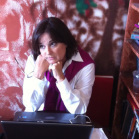 working @Cofee Cartel There's nothing I like better than a challenge or an adventure. When author and podcaster extraordinaire Stephen Campbell invited me to a Blog Hop - answer four questions about why and what I write and pass them on to another author - I couldn't resist. He tagged me to tell you a little bit about my life as a writer and, in turn, I'll ask Robin Blakely to do the same. Robin is the creative businessperson's guru, the power behind writers, artists and nonprofits.
working @Cofee Cartel There's nothing I like better than a challenge or an adventure. When author and podcaster extraordinaire Stephen Campbell invited me to a Blog Hop - answer four questions about why and what I write and pass them on to another author - I couldn't resist. He tagged me to tell you a little bit about my life as a writer and, in turn, I'll ask Robin Blakely to do the same. Robin is the creative businessperson's guru, the power behind writers, artists and nonprofits.So, we're off to the races. Tag, I'm it!
What am I working on? I am working on Dark Witness. This is novel 29 for me and the seventh book in the best selling Witness Series. One of the challenges in this book is to bring back two characters that readers have been worried about. I suppose it's the sign of a good series when people actually write to remind me that 'Hannah and Billy are still gone'.
How does my work differ from others of its genre? While I work from a legal of political premise, and the books are definitely classified as thrillers, my goal is to make the characters as real as they can be. The best plot in the world pales if the reader doesn't care about the characters. One reader wrote and said that she 'hadn't been so invested in a cast of characters since Lonesome Dove'. That is the highest praise and I strive to keep my characters unique and fresh.
Why do I write what I do? The law and politics have always intrigued me. There is a systemic life in these institutions that can't be controlled, it can only be manipulated. In these genres, every book is a puzzle to be put together and that's a wonderful challenge for a writer. Hopefully, the resulting book is a fun challenge for the reader, too.
How does my writing process work? After each book is published, I take a month off to do all the things I love - play tennis, sew, even clean the house - and let the ideas roll around in my head. Then I start again. I write every day and edit, edit, edit. It will all take eight to nine months to finish a book. I suppose my writing process is always a work in progress.
Now, back to writing Dark Witness . Visit my colleagues' blogs and see how different we are and, yet, how similar. Who knows, you might be inspired to join us.
 The president of Creative Center of America, Robin Blakely helps writers, artists, and industry experts build brands that are talent-driven and passion-fueled. Robin has an extensive background in publishing, strategic planning, and business development.
The president of Creative Center of America, Robin Blakely helps writers, artists, and industry experts build brands that are talent-driven and passion-fueled. Robin has an extensive background in publishing, strategic planning, and business development. 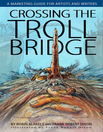 Her business books are
PR Therapy:
Ignite Your Passion for Promoting Your Products, Services and Even Yourself! and
Six Hats
: The Inside Out Strategy for the One-Person Business to Find Success. Her upcoming books are Crossing the Troll Bridge: A Marketing Guide for Artists and Writers; and Hello Mojo!: A 3-Day Guided Journey to Help Your Passion Find Your Purpose. Visit her at www.creativecenterofamerica.com.
Her business books are
PR Therapy:
Ignite Your Passion for Promoting Your Products, Services and Even Yourself! and
Six Hats
: The Inside Out Strategy for the One-Person Business to Find Success. Her upcoming books are Crossing the Troll Bridge: A Marketing Guide for Artists and Writers; and Hello Mojo!: A 3-Day Guided Journey to Help Your Passion Find Your Purpose. Visit her at www.creativecenterofamerica.com.May 5, 2014
Stories My Mother Told Me
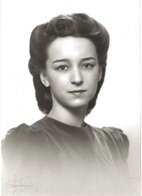 My parents made a pact to stand on every continent in the world. When my dad passed away, my mother went to the Antarctic for both of them. That’s when I figured there was a lot I didn’t know about mom.
My parents made a pact to stand on every continent in the world. When my dad passed away, my mother went to the Antarctic for both of them. That’s when I figured there was a lot I didn’t know about mom. When she returned with a bright orange jacket that she got ‘for free’ (don’t count the cost of the cruise), she had lots of stories to tell. Yet, when the excitement of the trip wore off, we both had the sense that we were still standing on a pitching deck with no way to sail to calm seas. A big piece of the puzzle – my dad – was missing.
“Write your memoir,” I said.
“My life wasn’t interesting,” she answered.
But the idea must have taken hold. Not long after this conversation, she called. She was done with her memoir.
“Impressive,” I mused.
It takes me months to write one novel and she finished hers in a week. When I saw her manuscript, I understood why. It was five pages long and she was eighty-five years old. There had to be more.
So began a year of weekend sleep-overs as we poured over photographs for inspiration. She had twenty beautifully documented photo albums, a box filled with pictures taken when cameras were still new fangled things.
There was mom in waist-length braids and Mary Jane shoes standing in the German village she called home.
She was a teenager in the U.S. while war raged in Europe, threatening the grandmother she had lived with, cousins and friends.
Here was mom, posing in a swimsuit she bought with the dollar she found on the street.
Mom in her twenty-five dollar bridal gown perched in the back of a hay wagon beside my father, a skinny, wide-eyed farm boy who would become a doctor.
Mom with one child. Two. Three. Five. Six of us all together. Dark haired and big eyed, we were her clones dressed in beautiful, homemade clothes. I remember going to sleep to the sound of her sewing machine.
And there were words! I bribed my mother with promises of Taco Bell feasts if she gave me details. Funny, what came to her mind.
To keep body and soul together when my father was in med school, he was a professional mourner and bussed tables for a wealthy fraternity. My mom worked in a medical lab where the unchecked radiation caused her to lose her first baby. They ate lab rabbits that had given their all for pregnancy tests. They were in love and happy and didn’t know they were poor. But St. Louis was cold, she remembered, and they couldn’t afford winter coats. Still, she insisted, they weren’t poor.
She typed, I edited; I typed, she talked. My youngest brother almost died when he was 10. She didn’t cry for a long while; not until she knew he would live. The captain of the ship that took her back to Germany was kind. She dreamed of becoming a missionary doctor. In 1954, she had two toddlers (me and my brother) and another baby on the way when she and dad drove to Fairbanks, Alaska where he would serve his residency at the pleasure of the U.S. Air Force. Her favorite outfit was a suit with a white collar. She loved her long hair rolled at her neck in the forties. In the fifties she made a black dress with rhinestone straps and her hair was bobbed. In the sixties she made palazzo pants and sported a short bouffant. She looked like a movie star in her homemade clothes. I wanted to grow up to be as glamorous as she was. She still thought she wasn’t interesting.
Mom wrote the forward to her memoir herself. It began:
A great sense of loneliness fills the house as twilight approaches. In the silence, I can almost hear the voices of my grown children as they recall their childhood years, the laughter of grandchildren and the quiet conversations of friends who have gathered here in years past, echoing through the empty rooms.
You see, she really had no need of my help as a writer.
We had seven copies printed. On the cover was a beautiful picture of a sunset. She called her book In The Twilight of My Life and would not be swayed to change it. Mom thought it perfect and not the least depressing. It was, she laughed, the truth. It was her laugh that made it right. She gave my brothers and sisters a copy for Christmas. My older brother had tears in his eyes. Everyone exclaimed: “I never knew that”.
Now I have a book more treasured than any I have written. I learned a lot about my mom and I realized why I create fictional women of courage and conviction, strength and curiosity, intelligence and, most of all, spirit. It’s because, all this time, I’ve been writing about my mother.
*For those of you who have already read this piece, I hope you won't mind me bringing it back this mother's day. My mom will be 90 in September and is still adding to her adventures. I hope you'll be inspired to ask your mother about hers, or to tell your children about yours.
April 20, 2014
Sunday Shoes
 Easter morning I wrote an email to my best buddy. It said:
Easter morning I wrote an email to my best buddy. It said:"Happy Easter."
"Thanks," she wrote back, "but to me it's just another day."
"Remember when Easter meant new Sunday shoes, a dress with a petticoat, and a straw hat with daisies?"
"I remember," came back the message. "I loved those days."
"It's a shame we don't have anything to look forward to anymore. It's a shame we don't dress up anymore."
We both signed off. We both lamented that Easter was no longer something to look forward to and plan for. I still remember a pair of lemon yellow patent leather flats that were tucked away in their box for weeks before I was allowed to wear them to church on Easter Sunday. When I put them on I felt like a princess. My mother made me a matching yellow dress with lace on the sleeves. And, there was the hat with daisies.
I now know that those shoes and that bit of lace had cost my parents dearly, but they never let on. Each of us four kids (there would eventually be six) was decked out, spit and polished. And, for the girls in the family - including my mom - there was a corsage from my father. Always carnations nestled in a clear box and put in the refrigerator to keep them fresh until my dad would pin them on our Easter dresses.
After the short conversation with my friend I thought about those long ago Easters. Those memories aren't precious because of the shoes or the hat or the corsage but because dressing up represented so many things: respect for our families and our church, acknowledgement of an important event, and celebration of a season when so many things seemed fresh and possible.
Over the last decade the world has become casual. Jeans are fine in church, at the theater, at grandma's house for dinner and one day is not distinguished from the next by how we dress.
Now Easter is over but I'm still thinking about those yellow shoes and church and hats with daisies. My mom is with us, my father long gone. I haven't worn a corsage in years and I'm not even sure a florist will still make them. I know I can't be that little girl in a crinoline and hat, but I am going to bring back that rite of spring.
The next time someone asks me to lunch, or my husband and I go to a movie, or we have friends to dinner, I am going to treat the day like those long ago Easters. I am going dress with care so that they know that I have looked forward to seeing them and that I think the moment is special. I will reach deep into my closet and I will put on my Sunday shoes - even if it isn't Sunday.
March 19, 2014
MY SON…THE AUTHOR?
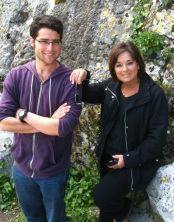 In Albania (Peace Corps) When my sons were born, I was delighted. I'd never been much of a girlie-girl so here were built in playmates. These were kids I could play sports and watch horror movies with, little people to cheer on as they grew into doctors, lawyer, merchants or chiefs of something.
In Albania (Peace Corps) When my sons were born, I was delighted. I'd never been much of a girlie-girl so here were built in playmates. These were kids I could play sports and watch horror movies with, little people to cheer on as they grew into doctors, lawyer, merchants or chiefs of something.Instead, my two guys loved theatre, dance, and, yep, the written word. Three weeks ago my youngest, Eric Czuleger, published his first novel. IMMORTAL L.A. is an urban fantasy blend of horror and science fiction but above all it's one of the most unique collections of love stories. I've always known he was a talented writer (he published his first play when he was 16 and is currently a semi-finalist for the prestigious O'Neill New Play Festival), but when he wrote his novel he was treading on my turf and I was ready.
The wisdom of a 29- year writing career was at his disposal. Sadly, or happily depending on how you look at the situation, he didn't need it.
IMMORTAL L.A.was perfect: unique in style, just enough twists to stand accepted genres on their head, hardly a comma out of place. That started me wondering. Did I succeed as a mentor simply because I stayed out of his way? I figured I 'd ask him.
Me: You didn't let me see your manuscript until it was finished. Do you and I have different interpretations of mentorship?
Eric: I think that you and I have different ways of working. You tend dump a bunch of sand on the beach and then carve the sandcastle out of it. I usually do my nit-picky work as I go. If I gave you my work before it was fleshed out it wouldn’t have made sense.
Me: Good point. I tend to give the lump of sand to my readers and there's only one who can ever figure out what I'm trying to say before I hit my stride. I did actually have some suggestions regarding L.A. Immortal's continuity and style. Was it hard to have that dialogue because I was your mom?
Eric: Not really, and I’m surprised by that answer, probably as much as you are. I think that admitting that you and I have insanely similar tastes but vastly different styles was harder to grasp.
I was editing the angel story one night. I didn’t want to work on the pages you had made notes on at home, so I went to the coffee shop. When I got down there I realized that I had forgotten the pages. I decided to just give it a good edit on my own and then see what your thoughts were when I got back to the pages. The edits were EXACTLY the same. Which was very weird but also very validating. Of course I don’t want you to be right all of the time, but good storytelling is good storytelling.
Me: I love that story. Perhaps we were channeling something because you were writing about fantastic things. Or, it could just be as simple as the fact that I was right. Do you think one mentor satisfy all of a new writer's needs?
Eric: You’re by far my most important mentor- but by no means my only one. Among other mentors I would list, John Patrick Shanley, Shakespeare, Raymond Carver, my buddy Dave, Jay Z, and anyone who has ever sat down with me to talk about telling stories, and which stories I should tell.
When I say that you’re my most important mentor, I mean that you taught me the only two things that really matter if you’re going to be a writer.
1. Love stories. Love making them up. Love living them. Love hearing them, seeing them, and telling them.
2. Sit down and write the whole thing out. Just do it. From beginning to end. Day in and day out. You can know every line of Shakespeare and compose the most masterfully phrased narrative passages, but if you don’t sit down day in and day out. If you don’t write the goddamn thing to the end, then it doesn’t exist, plain and simple. You work. You work every day. You work every night. You say that a book will be done and a couple of months later it is. It’s the simplest and hardest lesson for a writer to learn.
I was lucky to grow up hearing you typing.
Me: That is so nice. I would like to point out I did not edit the bad word out of this interview. I try to keep a light editing hand where you are concerned. What were the three experiences that shaped you as an author?
Eric:
1. I wrote a poem once. I don’t know why but we were in the library. You read it and you cried. I couldn’t figure out why, but I know that putting words on a page was important and should be done with care.
2. Listening to punk rock and rap while studying Shakespeare. Realizing the way that you said things mattered just as much as what you were saying.
3. Self-producing an agit-prop (agitation\propaganda - who knew) theatre piece in college called Molotov Cocktail. (We didn’t tell you about this for the following reasons: We broke into a theatre space, we snuck people in, we did a show full of profanity and nudity, and half-baked-junior-in-college politics. It went off with out a hitch. People loved it. It could have been better. It taught me that if my opinions were going to be put onstage then I better be able to stand behind them 100%. That’s when I realized I didn’t need an adult telling me that it was okay to make work happen.
Me: I would have had a fit if I'd known what you were doing back then. Today, I think it's a bummer you didn't invite me. You have written a very edgy, genre-bending book but to me each story - even the fantasy history of Los Angeles - is a love story. Did you realize that's what you were writing?
Eric: You and I have talked about this a bit, the idea that you can’t really escape the stories that you find attractive. When I wrote the second story I realized that it was thematically the same as the first. I never set out to write a love story but I realize that is what I did. I wanted to write a story that I found fun swarming with vampires and angels and zombies and freemasons and everything in between. I also wanted to these characters to be at their most vulnerable.
We always put fantastic creatures on this bizarre pedestal. Vampires are always sexy, their hair is impeccable, and they can sword fight. That couldn’t be less interesting to me. I want to see a heartbroken overweight vampire who watches infomercials. I want to see what it’s like when an “immortal” loves something deeply and that is not reciprocated. I want to see what it’s like when a group of immortals loves a city that cant love them back.
Me: And I love you for wanting to put not just your talent but your heart and soul into what you write. I loved every word, every turn of phrase, the fantastic twists, and the fact that IMMORTAL L.A. is written so that I can read from beginning to end or pick and choose my stories.
I am proud to be your mentor (non-mentor). PS I don't remember the poem but it must have been something if it made me cry. I think I'm about ready to do it again.
 You can reach Eric at: http://www.ericczuleger.com
You can reach Eric at: http://www.ericczuleger.comor leave me a comment right here!

